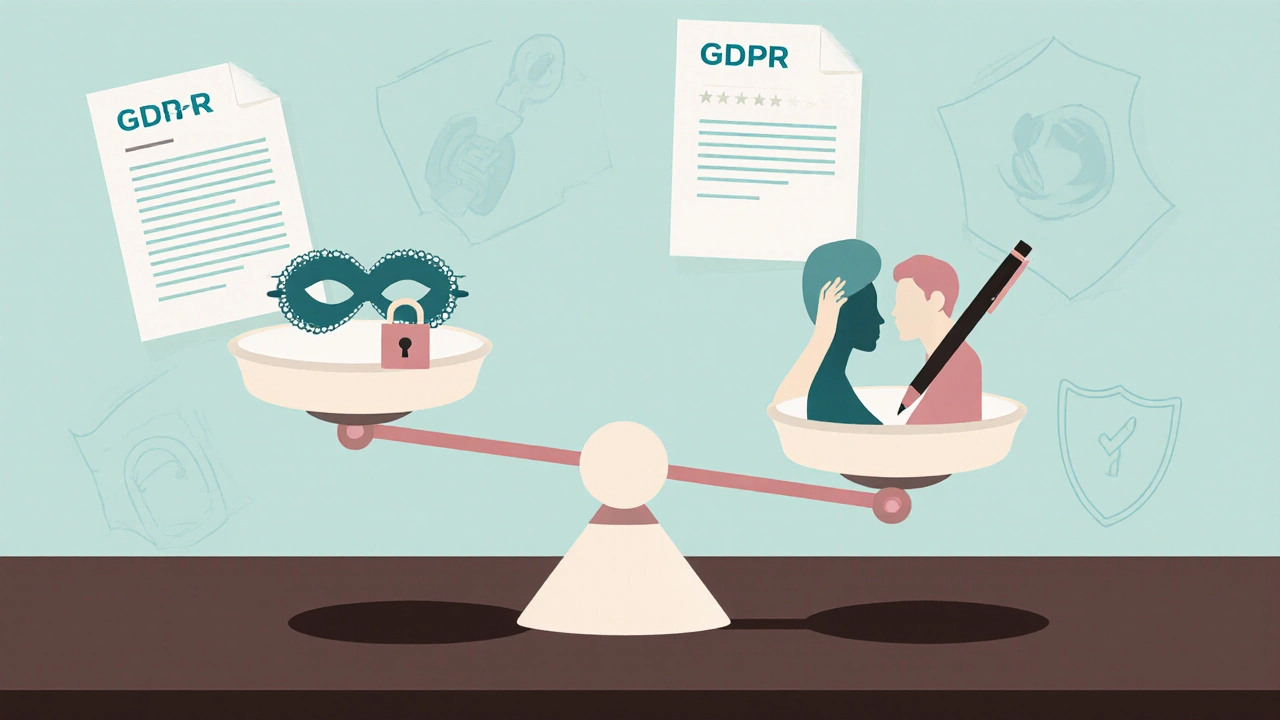Why Discretion and Privacy Matter When Writing Honest Escort Reviews

When you post an Escort Review is a written account that shares a client’s experience with an escort service, focusing on honesty, detail, and personal safety, you’re walking a tightrope between transparency and protection. In the world of London’s escort scene, the stakes are high: a single misplaced detail can expose a client, jeopardize an escort’s reputation, or even trigger legal trouble. This guide walks you through the why and how of keeping your words discreet without sacrificing authenticity.
What exactly is an honest escort review?
An honest escort review tells the truth about the service you received-what worked, what didn’t, and any red flags-while avoiding sensationalism. It’s not a rant; it’s a balanced snapshot that helps future clients make informed choices and pushes escorts to maintain high standards.
Why does discretion matter in escort reviews?
Discretion protects everyone involved. Clients avoid unwanted exposure, escorts preserve their professional image, and platforms stay compliant with data‑privacy laws like the UK GDPR. When reviewers strip away identifying clues, the community stays safe and the conversation stays focused on quality.
How can I keep my identity private while still being specific?
Use generic descriptors instead of personal details. Replace names with roles ("the client," "the escort"), drop exact dates, and avoid location markers beyond the city or borough. For example, say “the meeting was scheduled for a weekday evening” rather than “it was on 12October2025 at 7pm.”
What details are still useful without breaking privacy?
- Service type (e.g., GFE, companionship, BDSM).
- Professionalism indicators (punctuality, communication style).
- Physical description that’s not unique (hair color, height range).
- Safety measures taken (use of a public place for first meeting, verification process).
- Payment method clarity (cash, crypto, discreet invoicing).
Which platforms respect reviewer anonymity?
Not all sites treat anonymity the same. Look for platforms that offer:
- Optional username creation with no real‑name requirement.
- Encrypted connections (HTTPS).
- Clear data‑retention policies that delete IP logs after a set period.
Examples include EliteLondonReviews, DiscreetCompanions, and private sub‑forums on Reddit that enforce strict moderation.
How does GDPR affect escort review sites?
Under the UK GDPR, personal data includes any detail that could identify a natural person. Review sites must:
- Obtain explicit consent before publishing any potentially identifying information.
- Provide a “right to be forgotten” option for users.
- Ensure data is stored securely, using encryption at rest and in transit.
Failure to comply can result in hefty fines, so reputable sites invest in compliance teams.
What are the risks of a non‑anonymous review?
Publishing a review that reveals your identity can lead to:
- Employer or family discovering your activity.
- Potential blackmail or harassment.
- Legal scrutiny if the review includes illegal activity claims.
Even when you think the risk is low, the digital footprint can linger for years.

Can I use a pseudonym safely?
Yes-choose a pseudonym that isn’t linked to any of your social accounts. Avoid using the same handle across multiple platforms. A random combination of words or a scrambled phrase works best (e.g., "SilentMaple").
What’s the best way to structure a review for clarity?
Follow a simple framework:
- Context: Briefly describe the service booked (type, location range).
- Communication: How the escort responded to messages, set expectations.
- Experience: What actually happened, focusing on observable facts.
- Safety & Privacy: Any measures taken, how discreet the encounter felt.
- Conclusion: Overall rating and whether you’d recommend.
How do I rate an escort without being overly subjective?
Use objective criteria wherever possible. Instead of “she was gorgeous,” note “hair color was blonde, height estimated 5'7".” Instead of “the service felt cheap,” say “the hourly rate was £120, which aligns with market averages for similar services in Central London.”
What’s the difference between an anonymous and an identified review?
| Aspect | Anonymous Review | Identified Review |
|---|---|---|
| Privacy Risk | Low - no personal data disclosed | High - name or contact info exposed |
| Credibility Perception | May be questioned if no verification | Often seen as more trustworthy |
| Legal Exposure | Minimal - protected by anonymity | Potential liability if claims are false |
| Platform Policies | Usually allowed, with moderation | May be restricted or require proof |
How can I verify the authenticity of a review?
Look for signs that the reviewer followed the structured framework, used specific details, and avoided extreme exaggeration. Many platforms tag reviews that pass a verification algorithm (e.g., “Verified Guest”). If a site offers an optional screenshot upload of a discreet receipt, that adds weight.
What ethical guidelines should I follow?
Honesty, respect, and discretion form the core triad. Never fabricate details, never expose the escort’s personal contacts, and never reveal a client’s identity. Treat the review as a service‑industry critique, not a personal vendetta.
Should I disclose my own safety preferences?
Yes-mention if you required a public meet‑up first, used a safe‑word, or asked for a condom. This informs future clients about realistic safety expectations without naming anyone.
What if I spot a fake review?
Flag it to the site’s moderation team with a brief note: “review mentions impossible location” or “contains obvious copy‑pasted text.” Most reputable platforms act quickly to remove misleading content.
How often should I update my review?
If your experience changes-perhaps you booked a second session with a different outcome-consider adding a follow‑up comment. Some sites let you edit the original post; others let you add a “Update” field.
Can I share a review on social media safely?
Only if you strip it down to non‑identifying facts. Use a neutral tone, avoid naming the escort or service directly, and consider posting through a private group that enforces anonymity rules.
What tools help protect my identity when posting?
- VPN services (e.g., NordVPN, ExpressVPN) to mask IP address.
- Browser extensions that block trackers (e.g., uBlock Origin).
- Disposable email addresses for account creation.
Combine these with strong, unique passwords for each site.
What are some common pitfalls to avoid?
- Including exact dates, times, or addresses.
- Using recognizable nicknames or phone numbers.
- Over‑editing to sound overly positive or negative-readers notice bias.
- Leaving personal contact info in the comment section.
How does discretion improve the overall review ecosystem?
When reviewers feel safe, more people contribute genuine feedback. This creates a richer data pool, which in turn helps clients choose reputable escorts and pushes providers to maintain higher standards. It’s a win‑win for the whole community.
Frequently Asked Questions
Can I remain completely anonymous on mainstream review sites?
Most mainstream sites require at least an email or username, but you can use a disposable address and a pseudonym. Look for platforms that explicitly state they do not log IP addresses or that delete them after 30 days.
What should I do if a review I wrote is taken down for privacy concerns?
Review the site’s guidelines, remove any identifying detail (exact date, location, names), and resubmit. Most sites provide a template or a “how to stay anonymous” guide.
Is it legal to post negative but truthful reviews?
Yes, as long as the statements are factual and you avoid defamation. Stick to verifiable experiences and avoid speculation about the escort’s personal life.
How can I verify that a site complies with GDPR?
Check the site’s privacy policy for mentions of GDPR, data‑subject rights, and data‑retention periods. Look for a Data Protection Officer (DPO) contact and a clear process for requesting data deletion.
Should I mention payment method in my review?
Yes, if it adds context. State the method (cash, crypto, discreet invoice) without revealing exact amounts that could identify you or the escort.









Jamie Williams
October 17, 2025 AT 16:50In the grand theatre of digital surveillance, the very act of posting a review becomes a performance under an invisible audience, and one must therefore wield discretion as a shield against prying eyes. The guide’s emphasis on generic descriptors is not merely a nicety but a necessity, because every stray identifier is a breadcrumb for the ever‑watchful algorithms that monitor our nocturnal activities. Consider how a seemingly innocuous mention of a weekday evening can be cross‑referenced with public transportation logs, telephone metadata, and even the occasional nosy neighbour’s testimony. Ultimately this can culminate in a profile that could be weaponized against the unsuspecting client. The legal landscape, bolstered by the stern hand of GDPR, does not merely punish careless data handling, it also fortifies a narrative that personal privacy is a public good. This principle escalates the stakes for anyone daring to expose personal particulars. Anonymity therefore functions as a form of civil disobedience, a quiet rebellion against a world that seeks to commodify intimacy for profit and control. The recommendation to use pseudonyms such as “SilentMaple” is a subtle reminder that randomness itself can become a barrier to correlation, a tactic echoed in cryptographic circles where entropy is prized. Every piece of advice-whether it be employing a VPN, deleting IP logs after a prescribed interval, or substituting exact dates with vague temporal markers-acts as a circuit breaker in the sprawling network of data collection. The author’s insistence on “objective criteria” not only preserves the integrity of the review but also curtails the impulse to sensationalise. This denies opportunistic actors the sensational fodder they crave. In an era where even the smallest digital imprint can be harvested, the disciplined practice of stripping away identifying details becomes a form of personal hygiene, a necessary routine akin to washing one’s hands before a meal. It is this very hygiene that protects the delicate ecosystem of trust that underpins the escort community. Genuine experiences can be shared without the looming spectre of exposure. Thus the guide’s counsel is not an arbitrary set of restrictions but a carefully calibrated series of safeguards designed to balance transparency with the inviolable right to privacy.
Jackie Brosio
October 18, 2025 AT 03:46Even if it feels empty, the need for safety is real.
Max Cossío
October 18, 2025 AT 17:06It feels like walking a tightrope over a city that never sleeps, and every slip could become a headline whispered in the dark. The thrill of a secret encounter is tinged with dread when you think about who might be watching. I’ve seen friends ruin their lives because a careless detail was left on a forum. The stakes are higher than we like to admit, and the fallout can be unforgiving. That’s why the guide’s tips hit home like a lifeline. We deserve to share our truth without fearing a sudden knock on the door.
Kyle Levy
October 19, 2025 AT 06:26Honestly, the core issue is not simply privacy, but responsibility, and it behooves every reviewer to act with impeccable care, for the ramifications of reckless disclosure stretch far beyond personal embarrassment, they infringe upon the fundamental rights of both client and provider, and they erode the collective trust that sustains the entire ecosystem, therefore, strict adherence to the recommended anonymisation protocols is not optional, it is a moral imperative, and anyone who neglects this duty is, quite frankly, complicit in the very harms they claim to condemn.
Kevin Poston
October 19, 2025 AT 19:46Great point, the community thrives when we protect each other, and your emphasis on using VPNs and disposable emails is spot‑on, also remember that supportive feedback can lift an escort’s professional standards, and by sharing balanced, anonymous experiences we all contribute to a safer, more reliable environment, keep up the good work, and thanks for reinforcing such positive practices.
Scott Randall
October 20, 2025 AT 09:06Use generic terms, avoid dates, and delete IP logs.
Thiago Gonçalves
October 20, 2025 AT 22:26Nice job! 😊 Keeping details vague while staying specific is a smart balance. 👍
Tim Orrell
October 21, 2025 AT 11:46The epistemic architecture of disclosure necessitates a semiotic abstraction layer where lexical tokens are decoupled from identifier vectors this facilitates ontological resilience within the data substrate and aligns with the principle of informational sovereignty
Clay Caldwell
October 22, 2025 AT 01:06In many cultures privacy is intertwined with personal honor, so the guide’s advice resonates deeply with traditions that value discretion as a social virtue.
anjan tiwari
October 22, 2025 AT 14:26Sure, but you could just post anyway 🙂